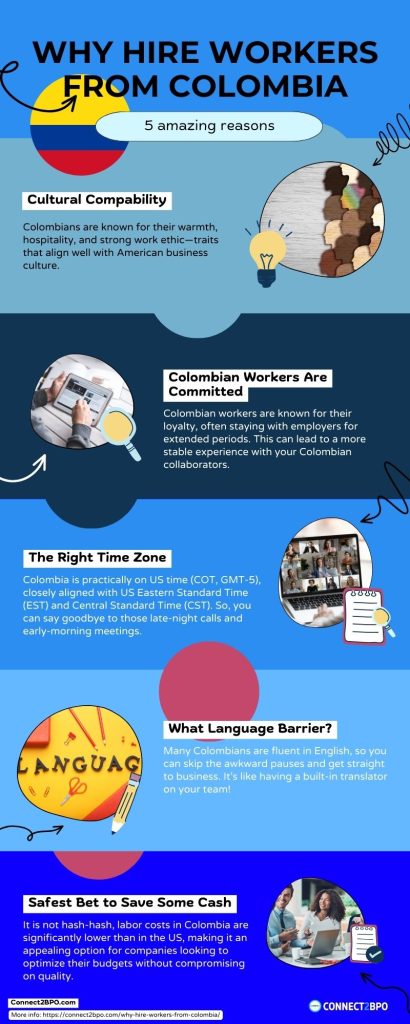We live in a globalized economy, and finding top-tier talent isn’t confined to one’s own country. Latin American countries, especially Colombia, present an attractive option for US companies looking to expand their workforce with skilled professionals. With its growing pool of educated and professional workers, cultural compatibility with the US, infrastructure, and cost advantages, Colombia is becoming a favored destination for remote hiring.
Download our interactive Colombia Hiring Guide it’s free, and automatically updates whenever laws or regulations change.
This article will explore why hiring workers from Colombia can be a strategic move for your business, covering everything from cultural alignment and time zone compatibility to legal considerations and cost breakdowns.
US Companies Hiring in Colombia
Core Advantages
Colombia is rapidly emerging as a hub for skilled professionals, especially in tech, customer service, and creative industries (such as marketing). With a talented and eager workforce, US companies can tap into a rich talent pool without facing the challenges that often come with hiring from distant countries. The proximity, language skills, and cultural similarities make Colombia an attractive option for American businesses.
- Highly Skilled Professionals: Colombia boasts a growing number of graduates in STEM fields, with universities in cities like Bogotá, Medellín, Barranquilla, and Cali producing top talent ready to take on roles in IT, engineering, and more.
- Reducing Costs: While the cost of living in Colombia is lower than in the US, companies can offer competitive salaries that are attractive to Colombian workers while still saving on labor costs.
- Cultural Alignment: Colombia shares many cultural similarities with the US, which can lead to smoother collaboration and communication.
- Time Zone Compatibility: Colombia’s time zone aligns closely with US time zones, making real-time collaboration more feasible compared to working with teams in distant Latin American countries or Asian countries.
- Economic Stability and Growth: Colombia has shown consistent economic growth, providing a stable environment for business operations.
Colombia and US: Culture Match
Cultural compatibility is a key factor when integrating remote teams into a business. Colombians are known for their warmth, hospitality, and strong work ethic—traits that align well with American business culture.
Additionally, the country’s growing middle class and increasing exposure to global media mean that Colombians are familiar with and understand Western business practices and consumer expectations. Colombian workers are not afraid to go the ‘extra mile’ in every process, improving their performance.
- Communication Style: Colombians tend to be direct yet polite, which aligns well with American business communication styles.
- Work Ethic: The Colombian workforce is known for its dedication, with many workers going above and beyond to meet deadlines and ensure the quality of their work.
- Cultural Awareness: With a strong emphasis on family and community, Colombian culture values collaboration and teamwork, which can enhance workplace dynamics.
Time Zones? No Problem
One of the most significant challenges of remote work is coordinating across time zones. However, when hiring workers from Colombia, this issue is minimized. Colombia operates in the same time zones as many parts of the US, particularly the Eastern Time Zone, which covers major cities like New York and Miami.
It is practically the same time zone, this alignment allows for real-time collaboration, reducing delays in communication and enabling teams to work together more seamlessly, forget about strangers meeting very early in the morning or too late at night.
- Real-Time Communication: With overlapping work hours, teams in the US and Colombia can hold meetings, collaborate on projects, and address issues in real-time, avoiding the lag that can occur when working with teams in vastly different time zones.
- Increased Productivity: Synchronized working hours mean that projects can move forward more quickly, with fewer bottlenecks caused by waiting for responses from team members in other parts of the world.
Language Problem? Mmm Not Anymore
English proficiency in Colombia is on the rise, particularly among professionals in the tech and business sectors. Many Colombian universities/colleges offer courses in English, and there is a growing emphasis on English language education in the country. This makes communication with US-based teams much easier, reducing the likelihood of misunderstandings and ensuring smooth collaboration.
- High Levels of English Proficiency: English proficiency is common in major cities, such as Bogotá and Barranquilla, and among the educated workforce. This is especially true for those in IT, customer service, and other industries where interaction with international clients is frequent. Colombian workers are ready to compete globally in business environments.
- Language Training Programs: Many Colombian professionals actively seek to improve their English skills through language training programs, making them even more attractive hires for US companies.
Colombia is the Safest Bet to Save Some Cash
It is not just a rumour, labor costs in Colombia are significantly lower than in the US, making it an appealing option for companies looking to optimize their budgets without compromising on quality. By hiring Colombian workers, US companies can offer competitive salaries that are attractive locally while still enjoying substantial savings compared to domestic hires.
- Lower Cost of Living: The cost of living in Colombia is lower than in the US, allowing companies to offer salaries that are competitive within the local market while saving on overall labor costs.
- High-Quality Talent at Reduced Costs: Companies can access top talent in Colombia for a fraction of the cost of hiring similar professionals in the US, making it an economically safe and sound decision.
- Potential Tax Benefits: Depending on the structure of the employment arrangement, US companies may also benefit from tax incentives or lower tax obligations when hiring internationally.
Colombian Workers Are Committed

Commitment and loyalty are hallmarks of the Colombian workforce. Employees in Colombia tend to stay with companies longer, especially when they feel valued and are provided with growth opportunities. This loyalty reduces turnover rates, saving companies time and resources in recruiting and training new employees.
- Loyalty and Longevity: Colombian workers are known for their loyalty, often staying with employers for extended periods. This can lead to a more stable experience with your Colombian collaborators.
- Strong Work Ethic: The dedication and commitment of Colombian employees mean that they are more likely to go the extra mile to meet company goals and deliver high-quality work.
- Focus on Professional Development: Many Colombian professionals are eager to continue learning and growing in their careers, making them motivated and engaged employees.
Options for Hiring Employees in Colombia
Once you’ve decided that hiring from Colombia is the right move for your company, the next step is determining the best way to do so. There are several options available, each with its advantages and considerations.
Want to save time and stay compliant? Download our Interactive Hiring Guide now, it stays up-to-date with the latest labor laws and regulations in Colombia.
Setting Up a Local Entity in Colombia
One of the most direct ways to hire employees in Colombia is to establish a local entity. This involves registering your company in Colombia, setting up an office, and hiring employees directly.
- Direct Control: By setting up a local entity, you maintain full control over your operations in Colombia, including hiring practices, company culture, and management processes.
- Compliance with Colombia Labor Laws: Having a local entity ensures that your business is fully compliant with Colombian employment laws, tax obligations, and other regulatory requirements.
- Long-Term Commitment: Establishing a local entity is a long-term commitment that makes sense for companies planning to have a significant presence in Colombia.
However, this option requires substantial upfront investment and ongoing administrative responsibilities, making it more suitable for larger companies or those with significant expansion plans in the region.
Partnering with an Employer of Record (EOR)
For companies that want to hire in Colombia without establishing a local entity, partnering with an Employer of Record Colombia (EOR) is a popular option. Here, in Connect2BPO we act like EOR, carrying aspects such as all the administrative and legal aspects of employment on the employer’s behalf.
- Quick and Easy Setup: With an EOR, you can start hiring in Colombia quickly without needing to navigate the complexities of setting up a local entity.
- Compliance Assurance: The EOR ensures that all employment practices comply with Colombian labor laws, reducing the risk of legal issues.
- Flexibility: An EOR provides flexibility, allowing you to scale your workforce up or down as needed without the long-term commitments of establishing a local entity.
This option is ideal for companies looking to test the waters in Colombia or those who want to focus on their core business activities while outsourcing HR and compliance tasks.
Engaging Colombian Contractors
Another option is to hire Colombian professionals as independent contractors. This approach offers greater flexibility and can be cost-effective, especially for short-term projects or when hiring specialized talent.
- Flexibility and Scalability: Hiring contractors allows you to scale your workforce up or down depending on project needs, without the long-term commitment of full-time employees.
- Cost Savings: Contractors are often less expensive than full-time employees since you are not responsible for benefits, taxes, or other employment-related costs.
- Specialized Skills: Contractors often bring specialized skills that can be difficult to find in full-time employees, making them ideal for niche projects or temporary needs.
However, it’s important to understand the legal distinctions between employees and contractors to avoid misclassification issues, which can lead to legal and financial penalties.
Key Considerations Before Hiring in Colombia
Hiring internationally comes with its own set of challenges and considerations. To ensure a successful hiring process in Colombia, it’s essential to approach it strategically and be aware of the unique aspects of the Colombian labor market.
Colombian Labor Market Is Easy to Understand But Not at First Sight
It’s important to understand the dynamics of the Colombian labor market. This includes knowing the demand for specific skills, the availability of talent, and the average salary expectations in the region.
- Skill Availability: Research the availability of the skills you need in Colombia. While the country has a strong pool of tech and creative professionals, certain niches may have limited talent.
- Salary Benchmarks: Understanding the local salary benchmarks will help you make competitive offers that attract top talent without overspending.
- Employment Trends: Stay informed about employment trends in Colombia, including which industries are growing and where the talent is concentrated.
Define Your Hiring Needs
- Role Clarity: Be clear about the roles you need to fill and the responsibilities associated with each position. This will help you target the right candidates and streamline the recruitment process.
- Skills and Experience: Determine the specific skills and experience levels you require. Consider whether you need senior professionals with extensive experience or if junior-level talent will suffice.
- Full-Time vs. Part-Time: Decide whether you need full-time employees or if part-time or project-based contractors would be more appropriate for your needs. Check our complete guide about working hours in Colombia, type of contracts, etc, totally free.
- Cultural Fit: Consider the importance of cultural fit when hiring. While Colombian workers generally align well with US business culture, it’s essential to ensure that candidates share your company’s values and work style.
Cultural Considerations
Understanding and respecting the cultural nuances of Colombia is key to building a successful and harmonious team. While Colombian culture is generally compatible with US culture, there are specific aspects to keep in mind.
- Communication Styles: Colombians value effective, respectful and polite communication. While they are direct, they also prioritize maintaining positive relationships, which may lead to more diplomatic phrasing in feedback or assertive discussions.
- Work-Life Balance: Family is a central aspect of Colombian culture, and work-life balance is highly valued. Be mindful of this when setting expectations around work hours and availability.
- Respect for Hierarchy: Colombians often respect hierarchical structures in the workplace. Understanding and respecting these dynamics can help in managing your team effectively.
- Holidays and Traditions: Colombia has numerous national holidays and cultural traditions. Being aware of these can help you plan around them and show respect for your team’s cultural practices. Check our guide to How Hiring in Colombia works.
Legal and Administrative Requirements
Here at Connect2BPO, created a complete guide to hiring in Colombia, explaining payroll, labor laws, types of contracts, and all requirements you should know to navigate successfully through the Colombian labor market.
Nevertheless navigating the legal and administrative aspects of hiring in Colombia is critical to ensuring compliance and avoiding potential legal issues.
- Colombia Labor Laws: Familiarize yourself with Colombian labor laws, which include regulations on working hours, overtime, minimum wage, and employee rights.
- Contracts: Ensure that employment contracts are compliant with Colombian law. Contracts should clearly outline the terms of employment, including salary, benefits, job responsibilities, and termination conditions.
- Social Security Contributions: In Colombia, employers are required to make social security contributions for their employees, including health insurance, pensions, and other mandatory benefits. Understanding these obligations is essential for budgeting and compliance.
- Taxation: Be aware of the tax implications of hiring in Colombia, including income tax, payroll taxes, and any applicable international tax treaties.
Recruitment Process
Implementing a structured recruitment process is key to finding and hiring the best talent in Colombia. Connect2BPO recruitment services take care of the entire hiring process for your company, from finding and sourcing candidates to onboarding your new employees.
We start by working closely with you to understand your specific needs, including the roles you need to fill and the qualifications you’re looking for. We search for the right candidates through various channels and coordinate interviews between you and the pre-selected candidates. We also handle background checks, assist in negotiating offers, and provide support with onboarding to ensure a smooth transition for your new hires.
This process should be tailored to the local market while aligning with your company’s global standards. These are the most common steps in Colombian recruitment processes:
- Job Advertising: Use local job boards, recruitment agencies, and social media platforms to reach Colombian candidates. Consider partnering with local universities for access to recent graduates.
- Interviewing: Conduct interviews that assess not only technical skills but also cultural fit and communication abilities. Given the time zone compatibility, interviews can often be conducted during regular US business hours.
- Background Checks: Perform background checks following Colombian laws, which may differ from those in the US. This can include verifying educational qualifications, work history, and references.
- Onboarding: Develop a comprehensive onboarding process that helps new hires integrate smoothly into your company. This should include orientation on company culture, tools, processes, and expectations.
AD TIME! By partnering with Connect2BPO, you can save time and resources while ensuring that you bring on top-quality talent. We offer the flexibility to scale your hiring efforts up or down based on your business needs, without the need for a permanent in-house HR team. Get the guide, or reach out to our team to get started — we’ll help you hire in Colombia compliantly and efficiently.
This approach is particularly beneficial if you’re expanding into new regions or industries, allowing you to focus on your core operations while we manage the complexities of the recruitment process.

Don’t Incurr in Legal Matters, Employment Considerations, and Legal Compliance:
When hiring in Colombia, it’s essential to distinguish between employees and contractors and to understand the legal obligations associated with each.
Employees vs. Contractors: Know the Difference
Misclassifying workers as contractors when they should be employees can lead to legal issues and financial penalties, usually for non-compliance with duties and employee payments. It’s crucial to understand the differences between the two classifications and ensure that your hiring practices comply with Colombian law.
- Employee Classification: Employees in Colombia are entitled to certain legal protections and benefits, including social security, health insurance, and paid time off. They also have specific rights regarding termination and severance pay.
- Contractor Classification: Contractors, on the other hand, operate independently and are responsible for their taxes and benefits. However, they do not have the same legal protections as employees. Ensure that the terms of engagement are clear and that contractors are genuinely independent.
- Avoiding Misclassification: To avoid misclassification, ensure that the working relationship aligns with the chosen classification. Factors to consider include the level of control over the worker, the nature of the work, and the contract terms.
Avoid Common Pitfalls
When hiring in Colombia, there are several common pitfalls, including misunderstandings of labor laws, cultural differences, and communication challenges.
- Understanding Labor Laws: Colombian labor laws can be complex and differ significantly from those in the US. It’s essential to work with local legal experts to ensure compliance and avoid costly mistakes.
- Managing Expectations: Ensure that expectations around work hours, communication, and deliverables are clear from the outset. This can prevent misunderstandings and ensure that both parties are on the same page.
- Respecting Cultural Differences: While Colombian culture aligns well with US business practices, it’s important to respect and accommodate any differences. This can include being mindful of local holidays, communication styles, and work-life balance.
Work Hours, Holidays, and Time Off
Colombian labor laws regulate work hours, holidays, and time off, and it’s important to understand these regulations to ensure compliance and maintain a positive work environment.
- Work Hours: Starting in July 2023, Colombia’s maximum working hours are set at 8 to 10 hours per day and 47 hours per week. Employers are required to respect non-working hours and avoid contacting employees outside of these times. The workweek will gradually reduce by one hour per year until it reaches 42 hours by 2026, without affecting salaries, benefits, or hourly wages. (see more details)
- Public Holidays: Colombia has a significant number of public holidays—18 in total. Employers are required to observe these holidays and provide employees with time off or pay a surcharge instead. (see more details)
- Paid Time Off: Employees in Colombia are entitled to paid annual leave, with the minimum being 15 working days per year. Additionally, there are provisions for paid sick leave and maternity/paternity leave. (see more details)
- Flexible Work Arrangements: Flexible work arrangements, such as remote work or adjusted work hours, are becoming increasingly common in Colombia. Offering flexibility can help attract and retain top talent.
Taking Care of Your Team
Providing a positive work environment and taking care of your employees’ well-being are crucial to building a loyal and motivated team in Colombia.
- Employee Benefits: Offering competitive benefits, such as health insurance, retirement plans, and professional development opportunities, can help attract and retain talent.
- Work-Life Balance: Promoting a healthy work-life balance by respecting employees’ time off and encouraging them to take advantage of their leave entitlements can improve job satisfaction and productivity.
- Professional Development: Many Colombian professionals are eager to continue learning and advancing in their careers. Providing opportunities for training, mentorship, and career growth can enhance employee engagement and loyalty.
- Health and Well-being: Supporting the physical and mental well-being of your employees is essential. This can include offering wellness programs, providing access to healthcare, and promoting a healthy work environment.
Saying Goodbye (the Right Way)
Terminating employment in Colombia requires careful adherence to legal procedures to avoid disputes and ensure a smooth transition.
- Legal Grounds for Termination: Colombian labor law stipulates specific grounds for termination, and employers must provide a valid reason for dismissing an employee. Termination without cause requires severance pay.
- Notice Periods: Employers are generally required to provide notice of termination, the length of which depends on the employee’s tenure and the terms of the employment contract.
- Severance Pay: In cases of termination without cause, employees are entitled to severance pay based on their length of service. The amount is typically one month’s salary for each year of service.
- Exit Process: Ensure that the exit process is respectful and compliant with local laws. This includes conducting exit interviews, providing final pay and severance, and assisting with the transition.
How to Pay Workers in Colombia
Paying workers in Colombia involves navigating both the legal and logistical aspects of international payroll. Ensuring compliance with local laws and understanding the best payment methods is crucial for maintaining a smooth operation.
Compliance
- Adhering to Colombian Tax Laws: Employers must comply with Colombian tax laws, which include withholding income taxes from employees’ salaries. It’s important to work with a local tax advisor or accountant to ensure that all tax obligations are met.
- Social Security and Benefits Contributions: As previously mentioned, employers are required to contribute to social security and other employee benefits. This includes making monthly payments to the relevant authorities and ensuring that all contributions are accurately calculated.
- Currency Considerations: Salaries and payments to employees in Colombia are typically made in Colombian pesos (COP). However, if you are paying contractors or freelancers who prefer to be paid in US dollars, you’ll need to account for exchange rates and potential currency conversion fees.
- Payroll Processing: For companies with multiple employees in Colombia, setting up a local payroll system or partnering with a payroll service provider can streamline the payment process and ensure compliance with local regulations.
Payment Methods
- Bank Transfers: The most common method of paying workers in Colombia is through bank transfers. Most employees and contractors will have a local bank account where their salaries or payments can be deposited.
- Payment Platforms: For contractors or freelancers, payment platforms like PayPal, Payoneer, or Wise can be used to transfer funds internationally. These platforms are convenient for paying in different currencies and may offer lower fees for currency conversion.
- Payroll Services: If you have a larger team in Colombia, consider using a payroll service that handles all aspects of payment processing, including tax withholdings, benefits contributions, and currency conversion. Here in Connect2BPO can simplify the process and reduce administrative overhead.
- Timing of Payments: Colombian law requires that employees are paid at least once a month. Some companies choose to pay bi-weekly, which is also acceptable. It’s important to make timely payments to maintain good relationships with your employees and comply with local regulations.
So, Why Hire Workers From Colombia
Because Colombia gives you something most markets can’t: a powerhouse workforce with U.S.-aligned skills, high service culture, competitive costs, and global-ready professionals. And when you partner with Connect2BPO, you unlock all of this with zero guesswork.
Connect2BPO is a recruiting firm, staffing agency, and Employer of Record (EOR) all in one; meaning Connect2BPO sources, vets, hires, trains, manages payroll, handles compliance, and takes on every legal responsibility so you can scale faster and smarter.
If you’re serious about building a world-class team in Latin America, don’t navigate this alone. Let Connect2BPO handle your hiring end-to-end. From talent sourcing to full EOR support, we make hiring in Colombia seamless, compliant, and cost-effective.
Book a consultation or start your recruitment with us today.



